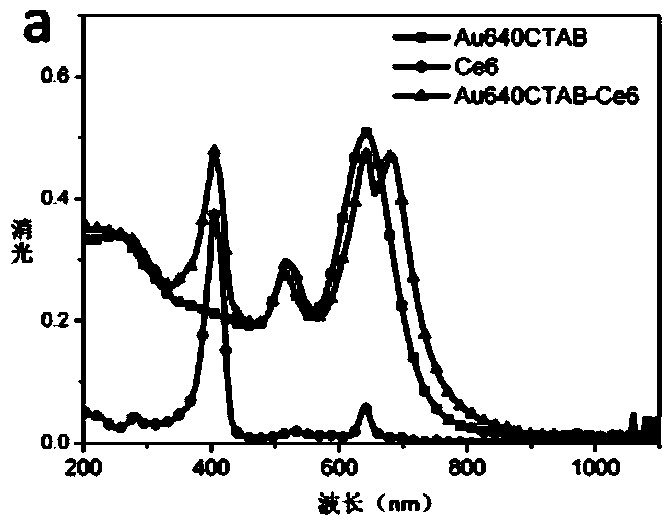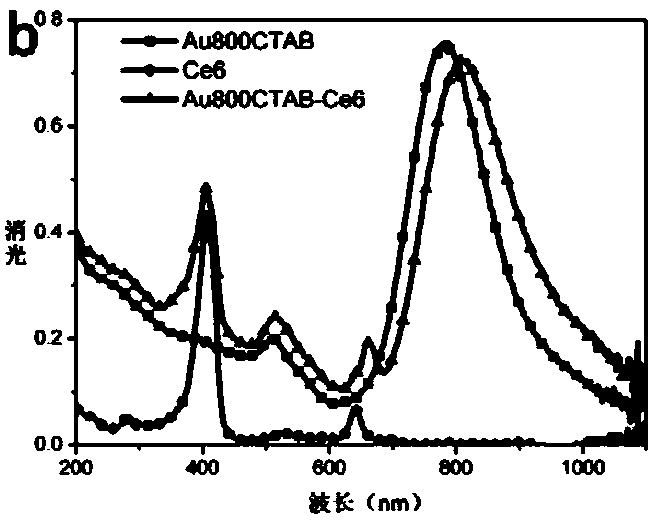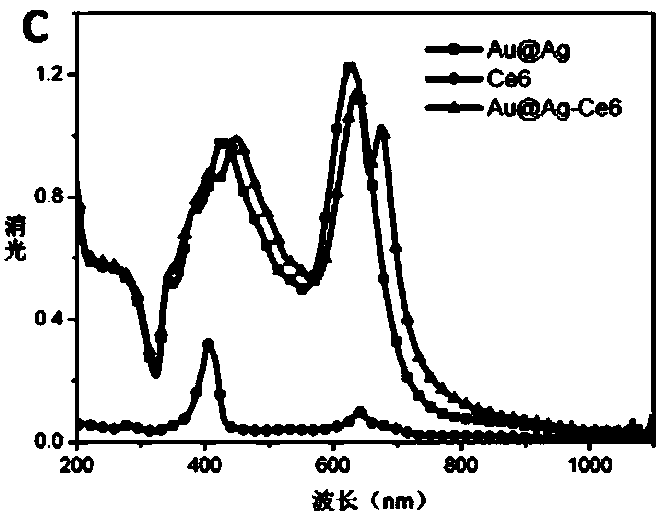Exciton-plasmon coupling system, its construction method and method for enhancing singlet oxygen generation of photosensitizer by using the coupling system
A technology of plasmonics and photosensitizers, which can be used in drug combinations, pharmaceutical formulations, wave energy or particle radiation treatment materials, etc., and can solve problems such as the lack of enhanced performance of plasmonic nanoparticles and the limitation of singlet oxygen.
- Summary
- Abstract
- Description
- Claims
- Application Information
AI Technical Summary
Problems solved by technology
Method used
Image
Examples
preparation example 1
[0060] (1) Preparation of surfactant-coated gold nanorods
[0061] a, preparation of gold seed:
[0062]Under constant temperature at 30°C, take 7.5mL of 0.1M CTAB aqueous solution, add 109.2μL of 22.9mM tetrachloroauric acid aqueous solution to it, mix well, dilute the volume to 9.4mL, add under the condition of magnetic stirring 0.6 mL of sodium borohydride aqueous solution with a concentration of 0.01M (prepared temporarily before use and stored in ice water) to prepare a mixed solution (wherein the molar ratio of CTAB, sodium borohydride and tetrachloroauric acid is 300:2.4:1 ), after stirring for 3min, let stand for 2-5h to obtain a gold seed solution containing gold seeds, and the concentration of gold in the gold seed solution is 0.25mM.
[0063] b. Preparation of surfactant-coated gold nanorods:
[0064] Take 100 mL of CTAB aqueous solution with a concentration of 0.1M, add 1.96 mL of aqueous tetrachloroauric acid with a concentration of 25.5 mM, and 100 μL of an aqu...
preparation example 2
[0068] a. The preparation method and conditions of gold seed crystals are the same as step a in Preparation Example 1.
[0069] b. Take 100mL of CTAB aqueous solution with a concentration of 0.1M, add 1.96mL of tetrachloroauric acid aqueous solution with a concentration of 25.5mM, 50μL of silver nitrate aqueous solution with a concentration of 0.1M, and add 550μL of 0.1M silver nitrate solution after mixing. Ascorbic acid aqueous solution, the mixed solution changes from orange to colorless, then add 240 μL of the gold seed solution of step (a), mix well and put it in a constant temperature water bath at 30°C, after standing for 12 hours, add 0.1M gold solution three times at intervals of 30 minutes 55.2 μL of ascorbic acid was used to obtain gold nanorods coated with surfactant CTAB (abbreviated as Au640CTAB) with the LSPR peak at 640 nm.
[0070] c. Purification of gold nanorods coated with surfactant:
[0071] The solution of the gold nanorods coated with the surfactant CT...
preparation example 3
[0073] Take 50mL of the gold nanorod solution coated with the surfactant CTAB whose LSPR peak is located at 800nm at a concentration of 0.5M obtained in Preparation Example 1, add 5mL of CTAB with a concentration of 0.1M, and then add 675 μL of silver nitrate with a concentration of 0.1M Aqueous solution, after shaking well, add 6.75mL of ascorbic acid with a concentration of 0.1M immediately, shake well, place the obtained growth solution in a constant temperature water bath at 70°C, and after 5 hours, obtain CTAB-coated gold rod core and silver shell with LSPR peak at 630nm Nanorods (abbreviated as Au@Ag).
[0074] Centrifuge the prepared Au@Ag rod solution at 9200rpm at 30°C for 10min, suck off the supernatant, then add deionized water equal to the volume of the sucked supernatant, and then add CTAB back into the solution. The concentration of CTAB in the solution was 1 mM, and after centrifugation under the same conditions, deionized water was added to adjust the concent...
PUM
| Property | Measurement | Unit |
|---|---|---|
| wavelength | aaaaa | aaaaa |
| wavelength | aaaaa | aaaaa |
Abstract
Description
Claims
Application Information
 Login to View More
Login to View More - R&D
- Intellectual Property
- Life Sciences
- Materials
- Tech Scout
- Unparalleled Data Quality
- Higher Quality Content
- 60% Fewer Hallucinations
Browse by: Latest US Patents, China's latest patents, Technical Efficacy Thesaurus, Application Domain, Technology Topic, Popular Technical Reports.
© 2025 PatSnap. All rights reserved.Legal|Privacy policy|Modern Slavery Act Transparency Statement|Sitemap|About US| Contact US: help@patsnap.com



